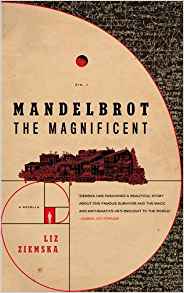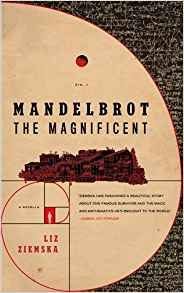Liz Bourke Reviews Mandelbrot the Magnificent by Liz Ziemska
 Mandelbrot the Magnificent, Liz Ziemska (Tor.com Publishing, 978-0-7653-9805-5, $10.99, 124pp, tp). November 2017. Cover by Will Staehle.
Mandelbrot the Magnificent, Liz Ziemska (Tor.com Publishing, 978-0-7653-9805-5, $10.99, 124pp, tp). November 2017. Cover by Will Staehle.
Mandelbrot the Magnificent is a striking and peculiar novella about real-life Jewish mathematician Benoît Mandelbrot, who was born in Poland in 1924, emigrated to France in 1936, and survived the Nazi occupation there. Later he would have the Mandelbrot set (a geometric fractal) named after him. Ziemska’s novella is told from Mandelbrot’s perspective, as an old man writing an account of his early life on a laptop in the near-present day. (I know that Mandelbrot wrote his memoirs; I have no idea if the voice of Ziemska’s Mandelbrot is anything like Mandelbrot’s own voice in those memoirs. My exposure to mathematicians has been fairly light.)
This retrospective voice is reasonably compelling, but Mandelbrot comes across as deeply arrogant. He’s intelligent and in love with mathematics. He knows that he’s intelligent, and he feels that mathematics are the most important thing in his world. As a child, he focuses his attention on his mathematician uncle Szolem, trying to impress him and learn from him; later, after emigrating to France and after Szolem emigrates to America, Mandelbrot teaches himself from books.
He’s oblivious-genius levels of annoying child, and in France, his unwillingness-bordering-on-inability to conceal how talented he is puts his entire family in danger of being denounced to the German occupation by envious bigots. In order to protect his family from his own errors of judgement, he combines mathematics with the sefirot of the Kabbalah to create a mystical construct – a dimension – that will hide his parents and their neighbours from detection. But he does not judge the effects of his construct as precisely as he might have wished.
Ziemska has written a love letter to mathematics, illustrated with diagrams of mathematical forms. Mandelbrot’s journey of discovery into mathematics brings him to a journey of mystical discovery as well: Ziemska draws on Jewish traditions of both secular and religious-mystical scholarship to give shape to Mandelbrot’s experience, his frame of reference, and his world. I’m just familiar enough with the ideas to have the sinking feeling that I’ve missed most of the references and a large part of the significance that Ziemska intends.
Ziemska’s prose is polished, her turns of phrase elegant, but Mandelbrot the Magnificent feels, above all, slight, both in size and in impact. I had no real emotional response to it, and my intellectual response falls more along the lines of “Well, huh,” than true appreciation. The flaw may well be in me, rather than in Mandelbrot: a novella so deeply invested in mathematics may well require a reader who can better appreciate mathematical beauty for itself rather than relating to maths more from the engineering perspective of what does it usefully do? It may also speak more deeply to people who share Mandelbrot’s cultural background. As for me, I’m not entirely sure what I think.
Liz Bourke is a cranky queer person who reads books. She holds a Ph.D in Classics from Trinity College, Dublin. Her first book, Sleeping With Monsters, a collection of reviews and criticism, is out now from Aqueduct Press. Find her at her blog, her Patreon, or Twitter. She supports the work of the Irish Refugee Council and the Abortion Rights Campaign.
This review and more like it in the January 2018 issue of Locus.






